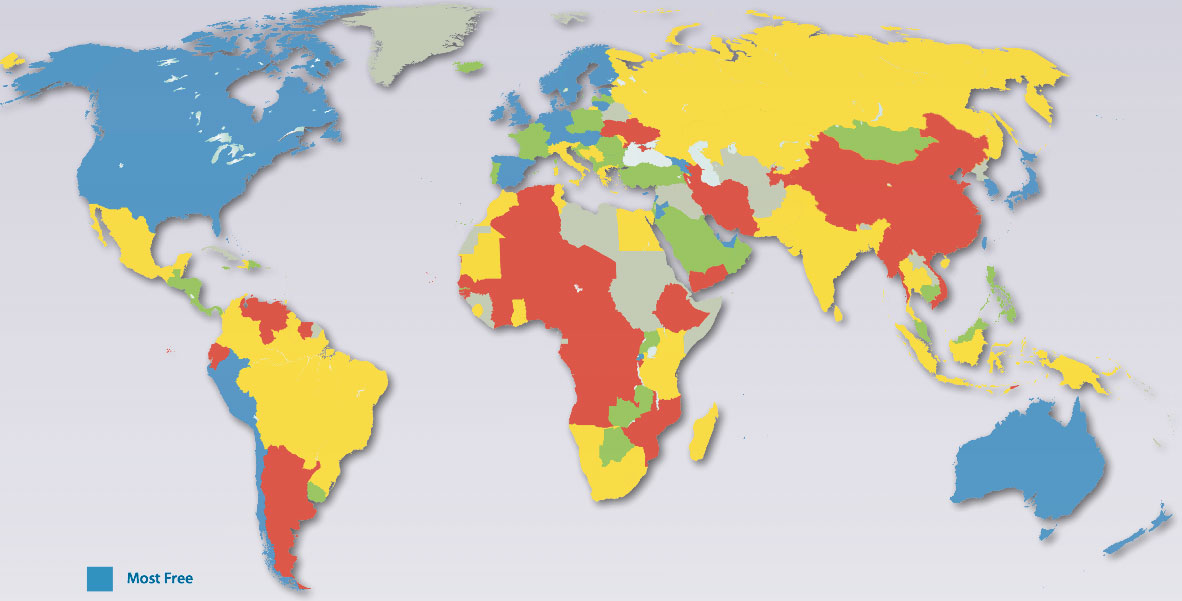In our culture figures and ranking are quite central, and the economic freedom is not an exception. There are several indexes which try to ranking countries through models nurture by statistic often taken from the World Bank, the International Monetary Fund and the Economist Intelligence Unit. Two of these indexes are probably the best-known worldwide. In general, their findings are not too different.
One is the Index of Economic Freedom created by the Heritage Foundation and Wall Street Journal. It is based on a series of 10 economic measurements. Namely, business freedom, trade freedom, monetary freedom, government size, physical freedom, property rights, investment freedom, financial freedom, freedom from corruption, labor freedom (all these factors are averaged equally into a total score).
A second index is the Economic Freedom of the World produced by the Fraser Institute, a Canadian think tank, in cooperation with the Economic Freedom Network, a group of independent research and educational institutes in nearly 90 nations and territories worldwide. This latter index used forty-two variables in five broad areas: size of government, legal system and property rights, sound money; freedom to trade internationally, and absence of regulation.
The 2013 Economic Freedom of the World report gives data of 2011 from 151 countries. According to this index, globally, the average economic freedom score rose slightly to 6.87 out of 10 compared to 6.74 the previous year .
Source: Economic Freedom of the World Report
- Hong-Kong and Singapore occupy the top two positions. The other nations in the top 10 are New Zealand, Switzerland, United Arab Emirates, Mauritius, Finland, Bahrain, Canada, and Australia.
- Chile (11th), Perú (22th) y Uruguay (43th) are the most liberal economies of Latin America.
- The rankings of some other major countries are the United Kingdom (12th), United States (17th), Germany (19th), Spain (32nd), Japan (33rd), Korea (33rd), France (40th), Italy (83rd), Mexico (94th), Russia (101st), Brazil, (102nd), India (111th), and China (123rd).
- The 10 lowest-rated countries are: Algeria, Democratic Republic of Congo, Burundi, Central African Republic, Angola, Chad, Zimbabwe, Republic of Congo, Myanmar, and—in last place—Venezuela.
Eight of the countries in the bottom ten are located in Africa. Cuba and North Korea are out of this ranking due to lack of information.
The question about the ethical significance lead us to analyzed which are the key elements used as conceptual based to construct the indexes.
The cornerstones for economic freedom of Economic Freedom of the World are: personal choice, voluntary exchange, freedom to compete, and security of privately owned property. This is very much aligned with thedefinition of economic freedom to laissez-faire capitalism.
More nuanced is the definition of economic freedom which supports the Heritage Foundation index: “Economic freedom is the fundamental right of every human to control his or her own labor and property. In an economically free society, individuals are free to work, produce, consume, and invest in any way they please, with that freedom both protected by the state and unconstrained by the state. In economically free societies, governments allow labor, capital and goods to move freely, and refrain from coercion or constraint of liberty beyond the extent necessary to protect and maintain liberty itself.”
From the ethical perspective, two main considerations can be made:
- First, respect for freedom is intrinsically good if is not abusive by powerful, since freedom is an essential human feature. In addition, economic freedom could contribute to the common good, since economic freedom tends to contribute to wealth creations rather than a system with less economic freedom. The report mentioned here empathized that there is a high correlation between countries with economic freedom and average per-capita GDP. Specifically, it says that nations in the top quartile of economic freedom had an average per-capita GDP of US$36,446 in 2011, compared to US$4,382 for nations in the bottom quartile in 2011.
- The second consideration is just the lack of information provided by these indexes about abuse or lack of responsibility in exercising freedom. Growing of GDP could be compatible with unfair working conditions or with lack of respect for the environment . On the other hand, regulations, being opposed to economic freedom, are not ethically necessarily objectionable. They can be reasonable, as well as abusive.
My conclusion is that such indexes should be combines with others which take into account a responsible use of such freedom.


